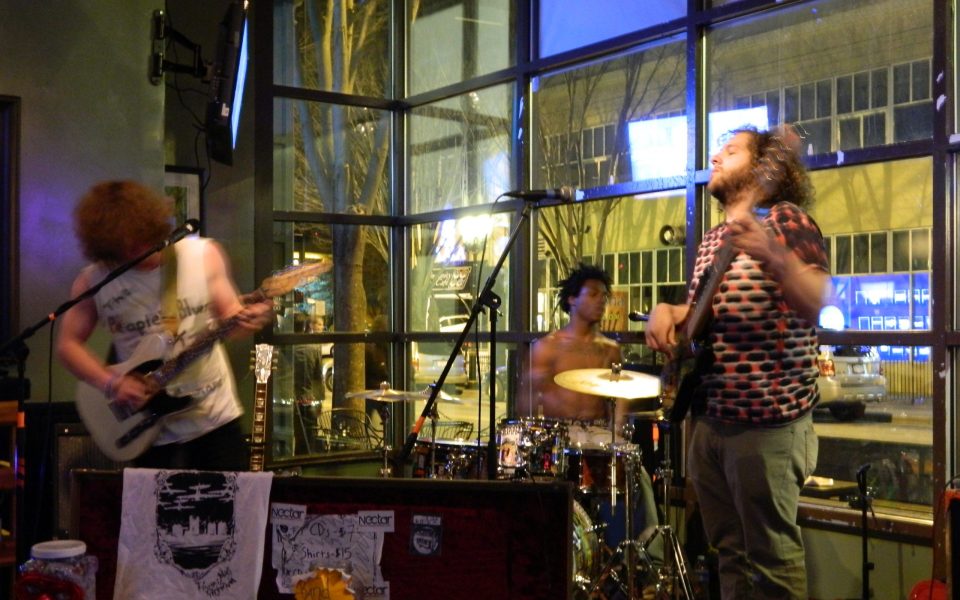by Jordan Green
The paradox of the People’s Blues of Richmond is that this is clearly a band whose epiphanies and joys are best experienced live, but their second recorded output, Good Time Suicide, captures that feeling more than leisurely pacing and acoustic deficiencies of the band’s recent show in Winston-Salem.
Bass player Matthew Volkes informed the middling but enthusiastic crowd at Bull’s Tavern on March 20 that despite sharing an acronym with Pabst Blue Ribbon, the band’s beverage of choice is cheap whiskey. That’s an apt metaphor for PBR’s ethos of solidarity through the sharing of affordable libations. Similarly, their latest batch of songs, true to the album’s title, explore the gritty throes of addiction, but manage to come through with a spirit of shared humanity and infectious revelry.
Immediately after recording finished, the quartet pared down to a trio, with the departure of keyboard player Tommy Booker, while Neko Williams took over drums from Raphael Katchinoff. The retooling allowed PBR to take their young-man’s blues to a new level of raw, primal power. Williams displays the uncommon ability both to sync tightly with his bandmates and thrash his kit with fierce athleticism.
Lead vocalist Tim Beavers II’s throaty howl combined with his feral guitar playing, Williams’ gonzo drumming and Volkes solid bottom end give the band a sound akin to a more raw, grittier Led Zeppelin. That’s the essential formula that has paid dividends for the White Stripes and Black Keys. But that’s hardly the sum of PBR’s qualities.
Both songcraft and a sonic palette suggesting the production of Dylan’s Blonde on Blonde are immediately evident on PBR’s recorded output. But the acoustics of Bull’s Tavern, a long hall with the stage backed up to a storefront window, didn’t do any favors for the band’s sound. Played at maximum volume — as it should be — the music came out sounding clamorous. There’s certainly a lot of dirt under this band’s fingernails, but there’s an exquisite and plaintive side that’s easy to wash out without the right attention to sound engineering. Between sets Volkes plied fans with earplugs, which enhanced the warmth of the sound, but also muddied it.
PBR has a loyal audience in Winston-Salem. Their first visit was to perform at a birthday party after one of their fans discovered them at the Getdown Music Festival in Mebane. Their fans — a high ratio of women to men — duly showed up to support the band on March 20, but at times it seemed like the band was a backdrop for the party rather than the focus of attention. The guys from PBR are obliging fellows who take the time to chat with fans, take shots and hand out swag — the aforementioned earplugs, along with beer koozies. They liberally salted their first set with covers, including two by the Black Keys — a suitable point of entry for their oeuvre — a selection from the Led Zep catalogue and a contemporary nod to Dr. John.
The requirements of bar work — two sets stretched over a period of three hours from 10 p.m. to 1 a.m. — also diminished some of the band’s power. It’s easy to imagine a PBR performance being nothing short of ferocious if compressed into a 45-minute set.
It’s evident that with relentless roadwork — just under 150 gigs in a year’s time — PBR is developing into a juggernaut, a leveling force. It’s fair to gauge that they’ve only just begun to uncover their potential.
Of all the covers they offered up during their Winston-Salem stop, “Ball and Chain,” the Big Mama Thornton song popularized by Janis Joplin, stands at the apex, with Beavers’ vocals nailing the emotional release.
But overall, the band’s own material shines brighter than the covers. The cathartic chorus of “Free Will” buoyed by a layered run of power chords, the hormonal resurrection of early ’70s trash rock in “Hard-On Blues,” the wicked mathematic execution of “Black Cat,” the electrifying blues boogie of “Nihilist” and the soul-searching tremolo of “Go Home” are all revelations.
Let’s hope the road doesn’t wear too hard on the People’s Blues of Richmond, so their proletarian gifts can continue to be shared.
Join the First Amendment Society, a membership that goes directly to funding TCB‘s newsroom.
We believe that reporting can save the world.
The TCB First Amendment Society recognizes the vital role of a free, unfettered press with a bundling of local experiences designed to build community, and unique engagements with our newsroom that will help you understand, and shape, local journalism’s critical role in uplifting the people in our cities.
All revenue goes directly into the newsroom as reporters’ salaries and freelance commissions.


Leave a Reply